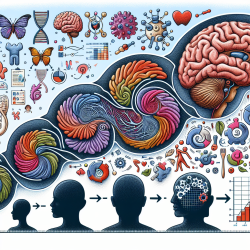Introduction
The realm of pediatric clinician-scientists is pivotal in bridging the gap between research and clinical practice, particularly in improving health outcomes for children. However, systemic biases continue to pose significant barriers to achieving equity, diversity, and inclusion (EDI) within this field. The recent study titled "Equity, Diversity, and Inclusion of Pediatric Clinician–Scientists in Canada: A Thematic Analysis" offers valuable insights into these challenges and proposes actionable solutions to foster a more inclusive environment.
Understanding the Challenges
The study identifies four interrelated themes that highlight the pervasive and often invisible barriers faced by women and racialized individuals in pediatric clinician-scientist roles:
- The Pervasiveness and Invisibility of Sexism: Female clinician-scientists often face challenges related to work-life balance, family planning, and career advancement, exacerbated by entrenched gender biases.
- The Invisibility and Visibility of Racism: Racialized individuals encounter both overt and covert racism, affecting their credibility and career progression.
- Proposed Individual-Level Solutions: The importance of mentorship and role models with shared experiences is emphasized as a critical support mechanism.
- Proposed Institutional and System-Level Changes: Systemic changes are necessary to address the "leaky pipeline" and create an environment that supports diverse clinician-scientists.
Strategies for Practitioners
Practitioners can play a crucial role in implementing the study's findings to improve their skills and contribute to systemic change:
- Seek Diverse Mentorship: Identify mentors who share similar experiences or who have demonstrated a commitment to EDI. This can provide invaluable guidance and support throughout your career.
- Foster Brave Spaces: Create environments where open discussions about EDI issues can occur without fear of reprisal. Encourage dialogues that challenge existing biases and promote inclusivity.
- Advocate for Institutional Change: Work towards systemic changes within your institution, such as revising recruitment and evaluation processes to ensure they are equitable and inclusive.
- Engage in Continuous Learning: Stay informed about EDI issues and participate in training sessions or workshops that focus on diversity and inclusion in healthcare.
Encouraging Further Research
While the study provides a comprehensive analysis of the current landscape, further research is needed to explore the nuances of EDI in pediatric clinician-scientist training. Practitioners are encouraged to contribute to this body of work by conducting studies that examine the experiences of underrepresented groups and developing interventions to address identified gaps.
Conclusion
Advancing EDI in pediatric clinician-scientist training is not only a moral imperative but also essential for improving health outcomes for diverse populations. By implementing the study's recommendations and engaging in further research, practitioners can help create a more equitable and inclusive environment for all.
To read the original research paper, please follow this link: Equity, diversity and inclusion of pediatric clinician–scientists in Canada: a thematic analysis.










